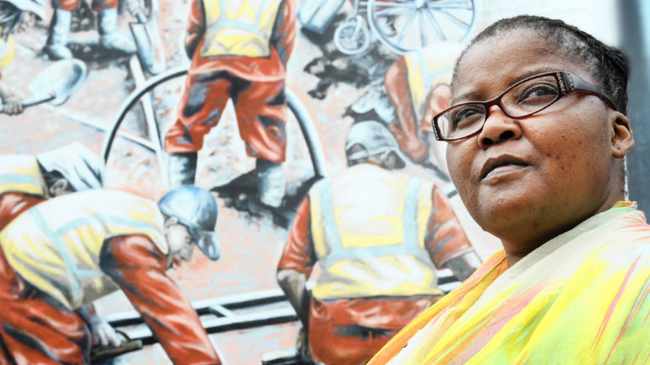
Gloria Kente
From Hong Kong to Qatar to Greece to the United States, domestic workers and women cleaners are under attack. They are under attack because they are women. In South Africa this year, domestic workers and women cleaners have confronted the attack head on.
Delia Adonis works as a cleaner in a mall in Cape Town. Last month, Adonis saw five men attack a sixth. She called the police, who intervened. She then went to the parking lot, where the five men encircled her, knocked her to the ground, and beat her. Throughout the assault, the men used racist and sexist epithets.
Adonis called the police and laid charges on the five men. It turns out they’re UCT students. Adonis claims that the police came to her and offered her money to drop the case. The officer allegedly said that the men were afraid of being kicked out of school. Adonis rejected the offer, and all it represented: “I’m really angry about this. I’m traumatised and still in pain. These youngsters verbally abuse us every weekend, and now this? I’m a mother of six – how would they feel if someone beat up their mothers like that? There was so much blood pouring from my face I couldn’t see. When I washed my face. I just thought to myself: ‘Boys, you can run but I leave you in the hands of the Lord’.”
Cynthia Joni works as a domestic worker in Cape Town. One morning, Joni was walking to work, when a white man leapt out of his car, slapped and threw her to the ground. She screamed, and he drove away. He was later identified and charged. His `explanation’ was that he mistook Cynthia Joni for a sex worker and `snapped.’ To no one’s surprise, it turns out that Cynthia Joni is not the first woman he’s assaulted. Now others are coming forth.
While the toxic mix in both the physical violence and then the subsequent violence that passes for explanation are important, the women’s response is more important. Domestic workers, sex workers, women workers reject the violence and call on the State to address it … forcefully and immediately.
Gloria Kente is a live-in domestic worker in Cape Town. Last year, her employer’s then-boyfriend got angry with her, allegedly grabbed her, spat in her face, and screamed a racist epithet at her. Kente called the police and had him charged with both assault and a violation of her human and civil rights. She called him out for hate speech and harassment. When the man tried to extend `an apology’, Kente said, “NO!” If an apology meant not going to court, not having the State fully involved, then Gloria Kente wanted no part of it.
Today’s stories echo the past. Over six years ago, four white students at the University of the Free State videotaped their assault on five cleaners, Mothibedi Molete, Mankoe Phororo, Emmah Koko, Nkgapeng Adams and Sebuasengwe Ntlatseng. The video went viral, as did disgust, and the cleaners, four women and one man, fought back. This June, the five cleaners launched their own company.
Today, however, domestic workers and women cleaners are making demands on the State. Domestic workers and women cleaners reject the protectionism that would see them as a separate class in need of help. They are workers with rights, women with rights, and humans with rights. As women workers increasingly demand their civil, labor, and human rights be respected, they consolidate power. The struggle continues.
(Photo Credit: IOL)